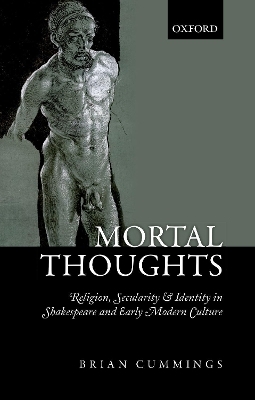
Mortal Thoughts
Oxford University Press (Verlag)
978-0-19-883118-1 (ISBN)
Since the nineteenth century it has been assumed that the concept of personal identity in the early modern period is bound up with secularization. Indeed, many explanations of the emergence of modernity have been based on this thesis, in which Shakespeare as a secular author has played a central role. However, the idea of secularization is now everywhere under threat. The secularity of modern society is less apparent than it was a generation ago. Shakespeare, too, has come to be seen in a religious perspective. What happens to human identity in this different framework? Mortal Thoughts asks what selfhood looks like if we do not assume that an idea of the self could only come into being as a result of an emptying out of a religious framework. It does so by examining human mortality. What it is to be human, and how a life is framed by its ending, are issues that cross religious confessions in early modernity, and interrogate the sacred and secular divide. A series of chapters examines literature and art in relation to concepts such as conscience, martyrdom, soliloquy, luck, suicide, and embodiment. Religious and philosophical creativity are revealed as poised around anxieties about finitude and contingency, challenging conventional divisions between kinds of literary and artistic endeavour. Mortal Thoughts considers incipient genres of life writing (More, Foxe, and Montaigne) and life drawing (Dürer, Hans Baldung Grien) in relation to dramatic representation and literary narration (Shakespeare, Donne, Milton). In the process it asks whether the problem of human identity rewrites historical boundaries.
Brian Cummings is Anniversary Professor at the University of York in the Department of English & Related Literature. He previously taught at Trinity College, Cambridge and the University of Sussex, and has held Visiting Fellowships in California, Munich, and Oxford. From 2009-2012 he held a Leverhulme Trust Major Research Fellowship. He is the author of The Literary Culture of the Reformation: Grammar and Grace (2002) and editor of The Book of Common Prayer: the Texts of 1549, 1559, and 1662 (2011), both published by OUP.
Introduction: Secularization and Identity
1: The Mortal Self: Dürer & Montaigne
2: The Reformed Conscience: Thomas More
3: The Writer as Martyr: Cranmer & Foxe
4: Public Oaths and Private Selves: More, Foxe, & Shakespeare
5: Soliloquy & Secularization: Shakespeare
6: Hamlet's Luck: Shakespeare & the Renaissance Bible
7: Freedom, Suicide, & Selfhood: Montaigne, Shakespeare, Donne
8: Soft Selves: Adam, Eve, & the Art of Embodiement: Dürer to Milton
Bibliography
| Erscheinungsdatum | 15.10.2018 |
|---|---|
| Zusatzinfo | 25 black-and-white halftones |
| Verlagsort | Oxford |
| Sprache | englisch |
| Maße | 147 x 219 mm |
| Gewicht | 478 g |
| Themenwelt | Geschichte ► Teilgebiete der Geschichte ► Kulturgeschichte |
| Geschichte ► Teilgebiete der Geschichte ► Religionsgeschichte | |
| Geisteswissenschaften ► Sprach- / Literaturwissenschaft ► Anglistik / Amerikanistik | |
| Geisteswissenschaften ► Sprach- / Literaturwissenschaft ► Literaturgeschichte | |
| Geisteswissenschaften ► Sprach- / Literaturwissenschaft ► Literaturwissenschaft | |
| ISBN-10 | 0-19-883118-8 / 0198831188 |
| ISBN-13 | 978-0-19-883118-1 / 9780198831181 |
| Zustand | Neuware |
| Haben Sie eine Frage zum Produkt? |
aus dem Bereich


